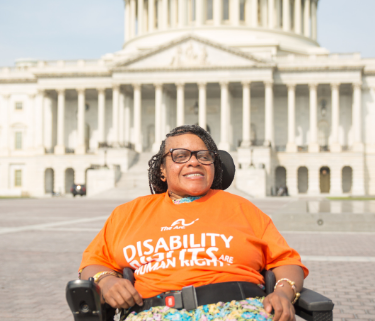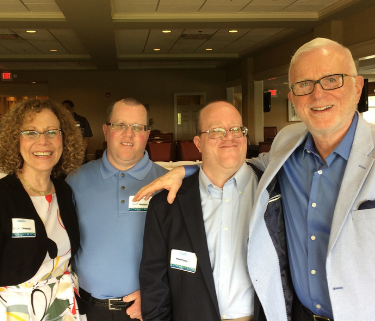Stuck in Time: SSI Desperately Needs Updating
By: Bethany Lilly
My parents celebrated their golden wedding anniversary last year. Fifty years is a long time, and so much has changed—the internet, cell phones, self-driving cars, and we’ve seen so many disability rights victories. Next year, the Supplemental Security Income (SSI) program will also turn 50. But this milestone for SSI is almost disappointing because in those 50 years, the rules of SSI have barely changed. Passed in 1972, SSI was designed to keep the lowest income adults and children with disabilities and older adults from living in poverty. But Congress has ignored this crucial lifeline and failed to update it, instead leaving people with disabilities and older adults trapped in deep poverty, for fear of going over the limits and losing benefits. Rules that haven’t been updated in a half century govern how much money people who rely on SSI can earn, how married couples who receive the benefit are treated by the federal government, the amount of income the program provides, and how much help family and friends are allowed to give to loved ones on SSI. Rules about how much people can save haven’t been updated for almost 40 years!
SSI is supposed to fill in the gaps of other government support programs, paying for housing and other expenses that aren’t covered by Medicaid. But the current rules make that almost impossible. If someone is relying on SSI, the cost of renting a one-bedroom apartment almost anywhere in this country will consume more than the maximum monthly SSI payment of $794, leaving practically nothing for other expenses like groceries and other necessities. And limiting savings to only $2,000 means that many people cannot save enough to even move into an apartment or house. People can end up trapped in institutional settings, with no ability to afford an alternative. Like so many other parts of the disability service system, SSI is crucial infrastructure that is crumbling due to decades of neglect.
Nothing has made that clearer than the pandemic. With a maximum monthly SSI benefit of $794, people with disabilities are struggling to afford the necessities of pandemic life like masks, grocery delivery, and increased prices for so many basic goods. Restricted from saving more than $2,000, no SSI recipient could rely on their savings to get them through the past 17 months and the uncertainty that is ahead during this ongoing pandemic. Accepting help from family, friends, or mutual aid means a benefit cut. And because of marriage penalties, couples face an even harsher financial reality. Even the government’s COVID relief efforts created problems–stimulus checks and unemployment insurance expansions created eligibility issues because the systems used to implement these rules are equally archaic, unable to adjust to new benefits. For the millions of people with disabilities who are eligible for Medicaid because they are eligible for SSI, this was not only an issue with income security, but also put their access to health care and home and community-based services (HCBS) at risk.
Just as the pandemic highlights the need to expand HCBS and finally address the workforce crisis for direct care workers, it also shows us that the program that is supposed to pay for everything else is trapping people with disabilities in poverty. Enough is enough. We must fix these archaic SSI rules.
President Biden acknowledge the need for change during the presidential campaign, calling for five major reforms to the SSI system:
1) increasing benefits to at least the federal poverty line
2) increasing income limits to encourage work
3) eliminating harmful rules penalizing help from family and friends
4) eliminating marriage penalties
5) increasing asset limits
Any one of these changes would dramatically improve the lives of the 8 million people who rely on SSI, including almost 1 million children with disabilities. It would help ensure that people with disabilities can live with their families and friends in their own communities, with the supports they need.
We have a rare opportunity – right now – to fix the crumbling disability service system by fixing SSI, expanding HCBS, and passing a national paid leave program. We must act on this opportunity!
#CareCantWait
50 years is a long time. Just ask my parents.








 There were no supports available outside of the public schools and the schools were not prepared to serve children with high levels of need. When my brother was kicked out of school at a very young age (before the federal law ensuring a right to education) for his disability-related behaviors, he had nowhere to go except home all day with a very loving caregiver. He missed the routines and rhythms of school and had a hard time staying home while everyone else went to work or school daily. He waited all day for the staggered returns of kids and parents, dinner, and then his beloved ride to the drugstore for a Coke and a long drive listening to rock and roll and beach music on the radio. Jud also had daily trips to the Post Office with our Dad to pick up the mail for his business, trips to the barbershop, church on Sundays, other local gathering places, and a house full of our friends and exchange students who lived with us at various times. He loved all the interaction and was known all over town.
There were no supports available outside of the public schools and the schools were not prepared to serve children with high levels of need. When my brother was kicked out of school at a very young age (before the federal law ensuring a right to education) for his disability-related behaviors, he had nowhere to go except home all day with a very loving caregiver. He missed the routines and rhythms of school and had a hard time staying home while everyone else went to work or school daily. He waited all day for the staggered returns of kids and parents, dinner, and then his beloved ride to the drugstore for a Coke and a long drive listening to rock and roll and beach music on the radio. Jud also had daily trips to the Post Office with our Dad to pick up the mail for his business, trips to the barbershop, church on Sundays, other local gathering places, and a house full of our friends and exchange students who lived with us at various times. He loved all the interaction and was known all over town. Sadly, as each of his older siblings began to leave home for college, military service, or otherwise, Jud’s physical size and his inability to control his frustrations and emotions became dangerous for our aging parents. After much searching and trying many approaches, the only available service for someone with his needs was the state institutional system. This was devastating for Jud, for our whole family, and for the many friends who had known him over the years. Jud suffered greatly from the travel distance from his family (even though we visited regularly), home and hometown, friends, and routines. And while there were some wonderful staff who supported him in his new location, we were horrified to learn that he also suffered some terrible abuses– the kinds of things that can be hidden when people who are unable to communicate or be understood cannot tell others what is happening to them. My father found that Jud had been burned with cigarettes and that other men in his unit had been more extensively burned. In other incidents, men in his unit died after being subjected to dangerous restraint methods. He also suffered from toxic environmental conditions, including asbestos and sewage leakage. As a family, we were determined to end these abuses.
Sadly, as each of his older siblings began to leave home for college, military service, or otherwise, Jud’s physical size and his inability to control his frustrations and emotions became dangerous for our aging parents. After much searching and trying many approaches, the only available service for someone with his needs was the state institutional system. This was devastating for Jud, for our whole family, and for the many friends who had known him over the years. Jud suffered greatly from the travel distance from his family (even though we visited regularly), home and hometown, friends, and routines. And while there were some wonderful staff who supported him in his new location, we were horrified to learn that he also suffered some terrible abuses– the kinds of things that can be hidden when people who are unable to communicate or be understood cannot tell others what is happening to them. My father found that Jud had been burned with cigarettes and that other men in his unit had been more extensively burned. In other incidents, men in his unit died after being subjected to dangerous restraint methods. He also suffered from toxic environmental conditions, including asbestos and sewage leakage. As a family, we were determined to end these abuses. Jud’s experiences fueled my passion to change the system. I worked in Washington to pass federal legislation to move the Medicaid funding bias away from institutions and to build the community service system, making the community the preferred service setting. My advocacy led me to a career in The Arc’s national public policy office, which I joined in 1984. While our systems have evolved since the 70s through the late 80s when my brother was experiencing so much pain, we still have a long way to go. I am happy to report that Jud was eventually able to leave the state institution and live in a group home about 7 minutes from our widowed mother in his beloved hometown for the last 20+ years of his life. Jud also experienced some serious problems in his group home, but those were able to be discovered and remedied because family were nearby and able to observe how he was doing. For those who understood him, Jud continued his mantra: “Stay at the new house; not gonna keep saying it” throughout those years, lest anyone think he would ever want to go back to the institution.
Jud’s experiences fueled my passion to change the system. I worked in Washington to pass federal legislation to move the Medicaid funding bias away from institutions and to build the community service system, making the community the preferred service setting. My advocacy led me to a career in The Arc’s national public policy office, which I joined in 1984. While our systems have evolved since the 70s through the late 80s when my brother was experiencing so much pain, we still have a long way to go. I am happy to report that Jud was eventually able to leave the state institution and live in a group home about 7 minutes from our widowed mother in his beloved hometown for the last 20+ years of his life. Jud also experienced some serious problems in his group home, but those were able to be discovered and remedied because family were nearby and able to observe how he was doing. For those who understood him, Jud continued his mantra: “Stay at the new house; not gonna keep saying it” throughout those years, lest anyone think he would ever want to go back to the institution.







